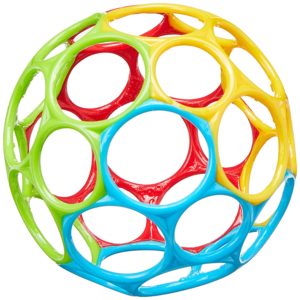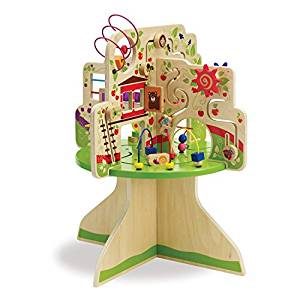Updated October, 2021
How much should I hold my baby? Am I going to spoil them? How independent does my child need to be? If I pick my baby up every time they cry are they going to manipulate me?
I get these questions and so many more all the time. The worst is that these questions often come from moms who want to comfort their crying babies but are getting advice from other people about not ‘spoiling’ their baby. I’m here to assure you that spoiling your child is not possible and that what you really want to do in the first year of your child’s life is build a secure attachment.

The Myth of Spoiling a Baby
Before I can even start a conversation around attachment, I need to debunk the myth that you can spoil a baby by holding them too often or picking them up when they cry. This myth stems from the fear that if you are responsive to your child’s needs, they will learn to manipulate you and cry just to get you to hold them.
Object Permanence
The simplest way for me to debunk this myth is by giving you a brief overview about Object Permanence. So object permanence is knowing that something exists even when we can’t see it. It has its abstract tendancies, such as we’ve maybe never seen Antarctica but we know it still exists. But it’s also more concrete than that. Our car still exists even when we are not driving in it, our kitchen still exists when we are not cooking in it, and our phone still exists even when it isn’t in our hand. Our families still exist even when they aren’t in the room.
Babies, however, do not develop object permanence until around 8 months. That’s why we play games like peek-a-boo. When you are not in the room, Junior isn’t crying for you specifically. They are just crying in general, because they have an unmet need. They can’t cry for you because it is literally out of sight, out of mind. Now when you come back in the room, your child remembers who you are. But their memories are not sophisticated enough at such a tender age to try to manipulate you.
Meeting Needs
So if baby has no idea you exist when you aren’t in the room, why are they crying to be held all the time? Well, because they are babies? This world, this big huge world, with unknown factors around every corner, is kind of scary. Most of all, if you think you’re the only person in it, it’s awfully lonely. Babies are crying because they have unmet needs. Maybe they are hungry, or tired, or they need a change. Or maybe they are bored or lonely. These are all feelings these little ones have, but they don’t have the abstract thought to understand that’s what they are feeling. So they cry, because that is their only way to communicate with you. They are asking you to help them feel safe, secure, and loved.

Attachment
Okay, now you understand that it’s impossible to spoil a baby and that crying is a way for baby to get their needs met. So, what is attachment, and why does it matter?
Attachment is how secure (or not) your child feels that you will meet their needs. In a perfect world, all children would have secure attachments. The more secure a child feels, the better they will be able to learn, grow, and play. If a child is forever unsure if they are safe or if their caregiver is going to be nice that day or not, they spend more of their time navigating that one relationship than they do exploring their world.
Attachment goes beyond just mom and dad. It is ideal that your child have a secure attachment with all of their caregivers. Attachment doesn’t mean that your child can never cry, or that you can never take a break, or if you don’t respond to a need immediately that they will be scarred for life. It means that you do the best you can to meet their reasonable requests most of the time.
Now there are different types of attachment, and if you want to learn more about them, I’m sure you can Google some results and get a quick overview. The different types of attachment are not what this post is about. This post is about building a secure attachment with your child.
Building a Secure Attachment
So you might be thinking that having a secure attachment with your child sounds great. Honestly, I would argue that building a secure attachment now will help you in your relationship with your child for their whole lives. This means even during that teenager stage (look, everyone is good at something, I do kids really well, but I’ve got some anxiety about the teenage years). Putting the time into your relationship now will pay off. So… how?
Meet Their Needs!
Am I broken record yet? Probably. Really though, the number one way to build a secure attachment is to consistently meet your child’s needs. Don’t force them to cry it out around sleeping (you can read my entire sleep series here if you need support with that), make them wait to eat when they are hungry, or even be alone when they need company. We need to stop asking our infants to be self sustaining as if they are adults. So give in, don’t worry about spoiling, and hold that baby.
Play Together
Not every interaction with your child has to have a prescribed purpose. A regular, easy way to build a secure attachment with your little one is just to spend time with them. Read books, sing songs, play with toys, hang out with them during tummy time, and just have fun. Regularly smile, touch, and talk to your baby. All the fun things about having a baby is what will help strengthen their attachment to you.
Take Care of Yourself
One of the most rewarding ways to build a secure attachment with your child is to take care of yourself. I know this sounds counterproductive, but the better care you have for yourself, the better and more consistent care you can provide for your child. So make sure you are getting enough sleep, eating well, and asking for help when you need it.

Caution
Just because you can’t spoil an infant doesn’t mean you can’t spoil a child, and I think this is where people get really split. If you stay in that mode of “you can’t spoil a baby” for too long, then you start having problems such as your child not sleeping at night or eating every 30 minutes just because or refusing to be set down. As your child grows, they will get smarter. As early as 37 weeks a child can begin acting sweet in order to get their way (yes, right around that 8 month mark). This doesn’t mean they will, it just means they can. So be sure that you grow and adjust your parenting as your child grows and their needs change.
The best thing you can do is remember that your baby is a baby, but they won’t be one forever. Always pay attention to your child’s developmental ability, and remember that every child’s abilities develop at a different rate. Meeting your child’s needs as reasonably and consistently as possible will help them feel secure with you. In the end, a more secure child is, the more they will grow and the more independent they will be because they know that if they leave your side, you will still be there when they return.











